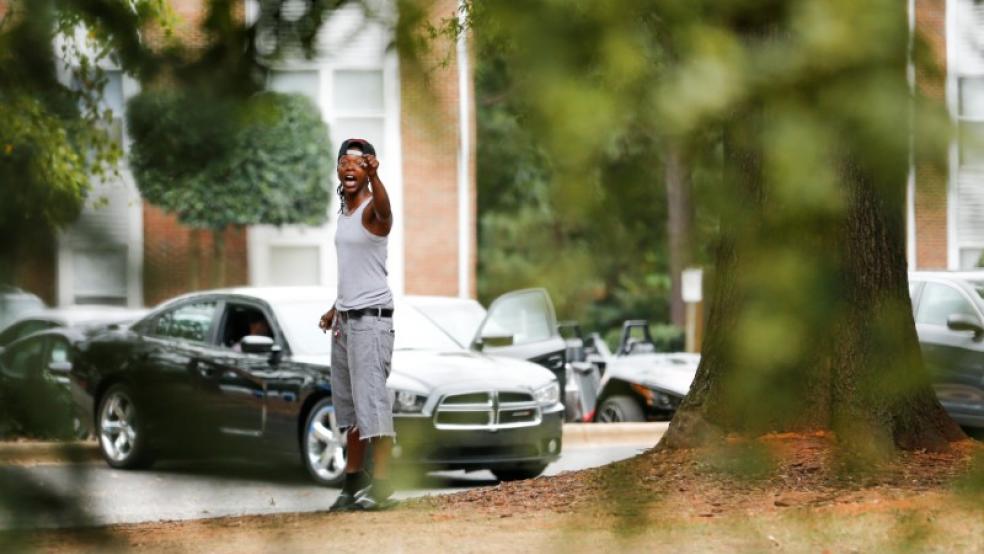Sunday’s shooting of three Baton Rouge police officers is just the latest in a series of mass murders that have riveted the nation and triggered a debate riddled with simplistic policy proposals.
Neither liberal solutions like gun control nor conservative proposals like tightening our borders and escalating the war against ISIS will end these attacks. The partisan debate not only offers proposals that are less effective than promised, but it also draws public attention away from a major driver of U.S. mass casualty attacks: America’s adventurous foreign policy.
Terrorism and mass murders are, unfortunately, a permanent part of our lives. Researchers have traced the history of terrorism back to the Zealots, a Jewish group resisting Roman occupation of Palestine in the first century AD. Islamic terrorism dates back to the Assassins of the 11th and 12th centuries. In the U.S., mass murder also has a long history: 18 Chinese immigrants were massacred in Los Angeles in 1871 and a 1920 Wall Street terror bombing killed 30.
Related: How France Could Have Prevented the Massacre in Nice
A mixture of policies can reduce but not eliminate terrorism and other mass attacks. But some policies can actually backfire — contributing to mass murders that may not have happened otherwise.
The left’s solution, gun control, seems reasonable, but its benefits would be very limited. Even a complete federal ban on all guns — a political non-starter — could be easily circumvented. Terrorists and other mass murderers have many alternatives to guns. The Nice terrorist killed 84 pedestrians and injured another 200 with a truck. America’s deadliest school massacre, executed by a defeated Michigan school board candidate in 1927, involved the use of dynamite rather than guns. That attack claimed 45 lives. And, of course, the 9/11 attacks involved planes and box cutters but no guns.
Also, banning guns won’t eliminate their availability or their use by mass murderers. Despite strict gun control in France, terrorists used illegal firearms to carry out the Charlie Hebdo attack and the Bataclan massacre. In Norway, a country that strictly controls firearm possession, a madman killed dozens of people with legally purchased guns.
A firearm ban in the U.S. would undoubtedly give rise to a larger black market allowing prospective murderers to purchase one of the over 310 million guns in the U.S. Killers can also assemble assault rifles from legal components or print them using new 3D printing technologies. A less extensive gun control regime compatible with our Second Amendment would still allow legally purchased firearms to be used for mass murder, as they were in Norway.
Related: Here's Why the Good Guy With a Gun Always Gets Killed
Conservatives often argue that terrorist attacks can be stopped by taking out ISIS. This exaggerates the nexus between terror groups holding territory in the Middle East and terror attacks in the West. Neither the San Bernardino attackers nor the Orlando shooter visited territory controlled by ISIS, nor did they appear to receive direct instructions from the terror group’s leadership. Instead, they responded to a general call to attack Westerners. Such calls can be issued by websites and social media accounts hosted in the West.
In the 1970s, the Palestine Liberation Organization carried out a number of bloody terror attacks, including one on the 1972 Munich Olympics, without controlling territory. The Boston Marathon bombers appear to have received direction and inspiration from forces in Dagestan, an integral part of Russia — hardly a nation sympathetic to Islamic terrorism.
Taking out ISIS won’t end Islamic terrorism any more than taking out Muammar Gaddafi, killing Saddam Hussein or deposing the Taliban did. Jihadism is a powerful ideology independent of any particular Muslim regime. It can spread without a national territory.
Using military means to fight terrorism is not only ineffective, but it can also backfire by encouraging more Islamic extremism. For example, Osama bin Laden turned his animus away from the Soviet Union and toward the United States after American troops were stationed in Saudi Arabia in the run up to the first Gulf War. One of the French jihadists who attacked a Paris kosher market in 2015 cited Western military action in Iraq, Afghanistan and elsewhere as a justification for his actions. ISIS forces its captives to wear orange jumpsuits to mimic the garb Guantanamo Bay detainees wear — reminding prospective recruits of the injustices of enemy combatant detention.
Related: Trump Blames Baton Rouge Shooting on 'Lack of Leadership'
But the recent shootings in Dallas and Baton Rouge suggest another form of blowback from U.S. military adventurism. Both shooters were veterans who received weapons training and were deployed to theaters of combat in the global war on terrorism.
These two most recent mass murderers were not the only ones with a military background, either. The very first mass shooting in America was carried out by a World War II veteran in 1949. Timothy McVeigh, who killed 168 people by bombing the Alfred P. Murrah federal building in 1995, was a decorated veteran of the first Gulf War.
These cases are symptomatic of a larger truth. As David J. Morris detailed in a 2014 Salon.com article, there is a long history of violence by veterans returning from combat. Morris traces the problem back to the aftermath of the Civil War, when a violent crime wave caused a 400 percent spike in the prison populations of some Northern states. He reports another spike in violent crime during the Vietnam War era as well as a sharp increase in murders and rapes near Fort Carson, Colorado while soldiers were deploying to and returning from Iraq. To quote Morris, a former Marine:
[W]hen you start looking at the individual cases of military veteran killers, a pattern begins to emerge: A rambunctious young man who never excelled in school joins the military; at first he loves the structure but eventually he begins to have trouble with his superiors. In time he goes off to war and is exposed to intense levels of violence. When he returns to the United States, he develops a substance abuse habit, partly to keep the horrific images of war at bay. This leads to a series of violent incidents and financial problems that seem trivial at first, then progressively worsen. Finally, high and/or drunk and unable to control his impulses, he ends up in an altercation with another soldier and ends up killing in what appears at first to be a random act of violence.
Terrorism and mass murder are not solely attributable to militarism, nor are they solely attributable to guns, Islamic radicalism, disrespect for the police or any other single cause. No policy or set of policies will prevent more of these terrible incidents in the future. But we should understand that sending young men into combat is every much of a contributor to the problem as firearms and radical Islamism. Thus, President Obama’s decisions to increase the number of troops in Iraq and to keep them in Afghanistan should cause concern to anyone worried about mass killings back home.






